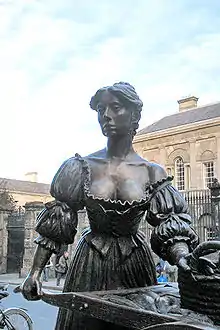茉莉·夢露
《莫莉·瑪儂》(Molly Malone)是一首流行於愛爾蘭都柏林的民謠,被視為都柏林市非官方主題歌曲。最早對《莫莉·瑪儂》的文字紀錄於波士頓出版。輕快的旋律、悲傷的結局,使她在19世紀末期的美國大學校園廣為流行。[1]
《莫莉·瑪儂》講述一個虛構故事,故事主角莫莉·瑪儂是一名靠賣漁維生的少婦,她每天辛勤地沿街叫賣,最後死於發燒。一般認為莫莉·瑪儂的遭遇乃是17世紀都柏林職業婦女的縮影──為養家餬口,她們白天從商,晚上還需從事性交易。[2]雖然無法證明莫莉·瑪儂是否確有其人,鑒於該歌之於都柏林的文化代表性,都柏林建市千年委員會仍於1988年承認莫莉·瑪儂係真實存在之人,並將其去世之日訂為1699年6月13日。[3]都柏林市長宣布6月13日為「莫莉·瑪儂日」,並為格拉夫頓街的莫莉·瑪儂雕像揭幕。該雕像由Jeanne Rynhart依照17世紀的平民婦女形象設計。[3]
2014年7月18日,由於都柏林輕軌建設工程,莫莉·瑪儂雕像被搬遷到薩福克街的遊客服務站前。[4]
歌詞
| In Dublin's fair city,
Where the girls are so pretty, I first set my eyes on sweet Molly Malone, As she wheeled her wheel-barrow, Through streets broad and narrow, Crying, "Cockles and mussels, alive, alive, oh!" "Alive, alive, oh, Alive, alive, oh," Crying "Cockles and mussels, alive, alive, oh". She was a fishmonger But sure 'twas no wonder For so were her father and mother before And they each wheel'd their barrow Through streets broad and narrow Crying "Cockles and mussels alive, alive oh!" "Alive, alive, oh, Alive, alive, oh," Crying "Cockles and mussels, alive, alive, oh". She died of a fever, And no one could save her, And that was the end of sweet Molly Malone. But her ghost wheels her barrow, Through streets broad and narrow, Crying, "Cockles and mussels, alive, alive, oh!" "Alive, alive, oh, Alive, alive, oh," Crying "Cockles and mussels, alive, alive, oh". |
在那都柏林市集,
充滿美麗姑娘的城市裡, 我看到甜美的莫莉·瑪儂。 她推著手推車, 走過大街小巷, 吆喝著:「蛤蜊與貽貝,新鮮呦!新鮮呦! 新鮮呦!新鮮呦! 新鮮呦!新鮮呦! 蛤蠣與貽貝,新鮮呦!新鮮呦!」 她是個魚販, 就跟她的父母一樣, 無庸置疑。 他們曾推著手推車, 走過大街小巷, 吆喝著:「蛤蜊與貽貝,新鮮呦!新鮮呦! 新鮮呦!新鮮呦! 新鮮呦!新鮮呦! 蛤蠣與貽貝,新鮮呦!新鮮呦!」 她死於流感, 沒人能拯救她, 這就是莫莉·瑪儂的一生。 但她的鬼魂仍推著手推車, 走過大街小巷, 吆喝著:「蛤蜊與貽貝,新鮮呦!新鮮呦! 新鮮呦!新鮮呦! 新鮮呦!新鮮呦! 蛤蠣與貽貝,新鮮呦!新鮮呦!」 |
參考
| 维基文库中的相关原始文献:Molly Malone |
註釋
- Hills, William H. (William Henry). . Cambridge, Mass. : M. King. 7 March 1884 –Internet Archive.
- Siobhán Marie Kilfeather, Dublin: a cultural history, Oxford University Press US, 2005, p. 6.
- . homepage.eircom.net. [2013-09-28]. (原始内容存档于2011-01-29).
- Flaherty, Rachel. . The Irish Times. 1 May 2014 [2020-10-05]. (原始内容存档于2020-11-12).
